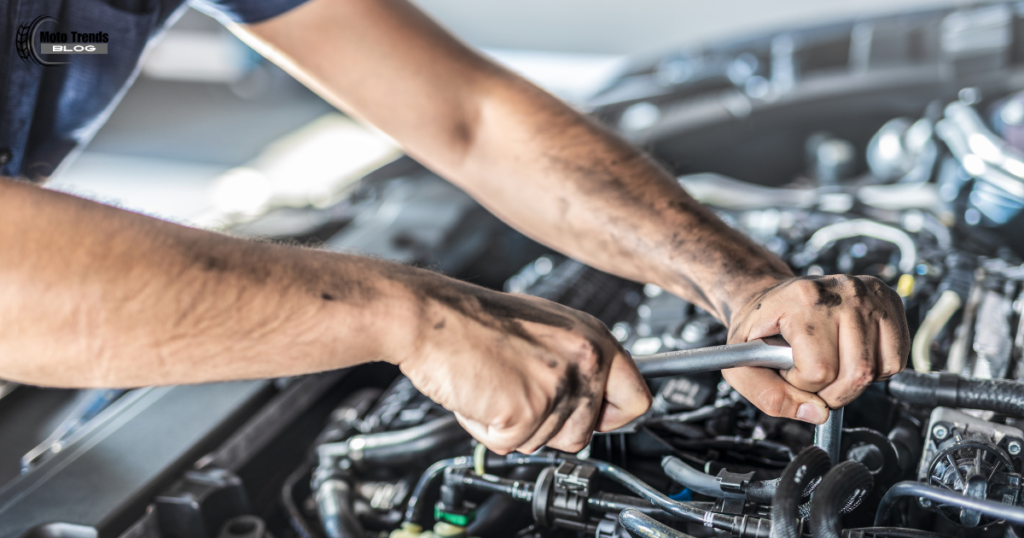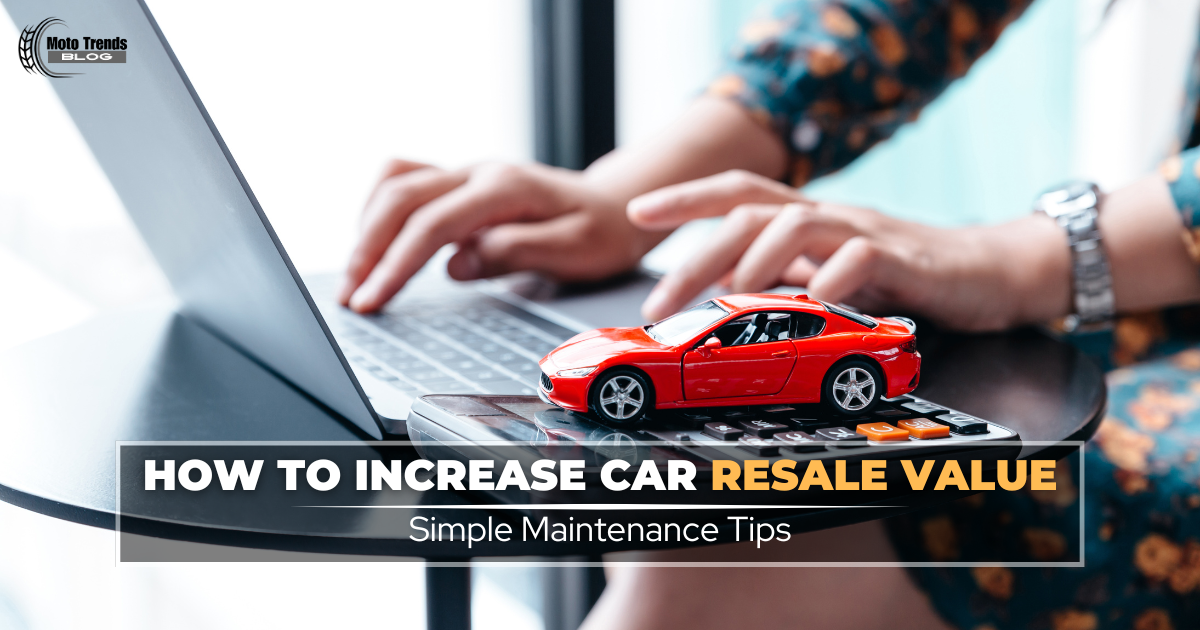When it comes time to sell or trade-in a car, most owners want to get the best price. However, the resale value of a car doesn’t just depend on its age or model. In fact, how well the vehicle is maintained can also play a huge role in determining its value. Regular maintenance not only keeps your car running smoothly but can also have a big impact on the amount a buyer will pay. Simple maintenance like oil changes, tire care, and regular cleaning can contribute to keeping your vehicle in tip-top condition, which ultimately helps to increase car resale value.
In this blog, we will learn about maintenance habits that increase the value of your car and make it more attractive to potential buyers. Let’s take a look at some of the best ways to increase car resale value with simple maintenance.
Why Regular Maintenance Matters for Resale Value
Many car owners don’t realize how much value they can save through consistent maintenance. Regular maintenance not only enhances your car’s performance but also sends buyers a reassuring signal that the car has been well cared for. Below are some of the main reasons why regular maintenance is important for increasing a car’s resale value:
- Value Preservation: Performing regular maintenance helps maintain the car’s functionality and appearance, making it less likely to break down. This preservation is important when it comes time to sell the car, as buyers are willing to pay more for a car that is in good condition.
- Buyer Confidence: Buyers want to feel confident about their investment. A well-maintained car with documentation of regular care reassures them, which can ultimately increase car resale value.
- Cost Efficiency: Preventive maintenance saves you from costly repairs. Solving small problems early means they are less likely to turn into bigger, more expensive problems, which ultimately contributes to a higher resale value.
Simple Maintenance Tips to Increase Car Resale Value

Implementing these maintenance habits can help keep your car in optimal condition, enhancing its resale potential.
1. Oil Changes and Fluid Checks
One of the easiest ways to increase car resale value is by ensuring that oil changes and fluid checks are performed regularly.
- Frequency: Oil changes should generally be done every 3,000-5,000 miles, though this can vary by vehicle. Check the owner’s manual for detailed information on your car’s needs.
- Impact on Engine Health:Clean oil lubricates the engine, reduces friction and prevents overheating. Over time, oil deteriorates and accumulates particles that can cause engine wear. Regular oil changes keep the engine clean and running smoothly, which is a major factor in maintaining or even increasing car resale value.
- Additional Fluids: Other important fluids include coolant, brake fluid, transmission fluid and windshield wiper fluid. Keeping these at proper levels ensures optimal performance.
2. Keep the Tires in Good Condition
Tires are one of the most visible indicators of a car’s condition and can greatly influence a buyer’s perception. Here’s how to manage them to increase car resale value:
- Check Tire Pressure: Properly inflated tires are safer, last longer and contribute to better fuel efficiency. Under inflated tires can cause uneven wear, making the car look poorly maintained.
- Rotate and Align Tires: Regular tire rotations (usually every 6,000-8,000 miles) and alignment prevent uneven wear. Even tire wear translates to a smoother, safer driving experience.
- Tread Depth: Make sure the tire tread is not too worn. Replacing old tires can make a car look more attractive and even increase its resale value.
3. Regular Brake Inspection and Maintenance
Brakes are a key safety feature, and their condition can be a dealbreaker for many buyers. Keeping them in good shape will help increase car resale value:
- Importance of Brakes: Buyers prioritise safety, and functional brakes are essential. Brake wear is a red flag indicating that the car hasn’t been properly cared for.
- Signs of Wear: Brakes that squeak, grind, or have less response may need to be replaced. Address these signs immediately to prevent further damage and costly repairs.
- Brake Pad Replacement: Brake pads should be inspected regularly and replaced as needed. New brake pads not only improve safety but also increase a car’s resale appeal.
4. Interior and Exterior Cleaning
A car’s appearance is one of the first things potential buyers notice. A clean, well-maintained exterior and interior can increase car resale value by leaving a strong first impression.
- Frequent Washes: Dirt, road salt and other contaminants can damage paint if left unattended. Washing your car every couple of weeks (or weekly in harsh climates) helps maintain the paint and prevents rust.
- Interior Detailing: The interior should be cleaned regularly to prevent stains, odors and other damage. Clean seats, carpet and a dust-free dashboard can make your car look much newer and more attractive.
- Paint Protection: Applying a wax or ceramic coat to the paint can create a barrier against the elements, keeping the car’s finish looking fresh. This can be an inexpensive way to increase car resale value.
5. Regular Battery Check
A car’s battery is critical to its performance, and a dead or weak battery can be a turn-off to buyers. Maintaining a healthy battery can help increase car resale value:
- Battery Life: The average car battery lasts about 3-5 years. A new battery is always more attractive to potential buyers.
- Corrosion Check: Corrosion on battery terminals can cause the battery to not function properly. Cleaning off the corrosion deposits with a mixture of baking soda and water helps maintain the health of the battery.
- Replacement Tip: If the battery is nearing its end of life, consider replacing it before selling the car. A new battery is a small investment that can pay off by increasing the car’s resale value.
6. Replace Worn-Out Parts
Replacing simple, inexpensive parts can also help increase a car resale value. Some parts may show signs of wear long before they become a major problem, and replacing them can make a big difference.
- Common Wear Items: Items like windshield wipers, air filters, and spark plugs may seem minor, but they play a key role in a car’s overall condition.
- Cost-Benefit: These parts are typically inexpensive, but replacing them can prevent potential performance problems. For example, a dirty air filter reduces fuel efficiency and puts stress on the engine.
- Impact on Buyer Perception: Replacing worn parts signals to potential buyers that the car has been cared for and regularly maintained.
Document Your Maintenance
A well-documented maintenance history can add credibility to your sale and increase car resale value. Here’s how to organise and present maintenance records:
- Why Documentation is Important: Maintenance records build trust with potential buyers, showing them that the car was regularly cared for. A documented history of oil changes, tire rotations and brake checks is especially valuable.
- What to Document: Include records of all routine maintenance, such as oil changes, tire rotations, brake inspections and part replacements. Keep receipts and any service history reports provided by the mechanic.
- Presentation Tip: Organise the records in chronological order, and present them in a neat folder when showing the car to potential buyers. This shows professionalism and transparency, which can help you increase car resale value.
The Long-Term Benefits of Regular Maintenance
Car maintenance is more than just maintaining its resale value; it’s also about keeping it running smoothly and safely. Here are some additional long-term benefits of regular maintenance:
- Enhanced Durability: Regular maintenance can increase a car’s lifespan. Taking care of the engine, brakes, and tires means your car will serve you longer and hold its value better.
- Higher Trade-In Value: Dealerships and buyers are willing to pay more for well-maintained cars with a history of regular maintenance.
- Better Negotiating Power: With a documented history of maintenance, you’ll have a stronger bargaining position, giving you more leverage to ask for a higher price when it’s time to sell.
Conclusion
Increasing your car’s resale value doesn’t have to be an expensive or complicated process. Simple maintenance habits—like regular oil changes, tire care, and keeping the interior clean—can go a long way in maintaining your car’s value. When combined with a well-maintained maintenance record, these practices can help you get a better return when it comes time to sell.
By following these tips, you’ll not only keep your car running at its best, but also significantly increase car resale value. Regular maintenance is an investment that pays off in terms of both performance and potential resale price. Start practicing these habits today to maximize your car’s value tomorrow!

